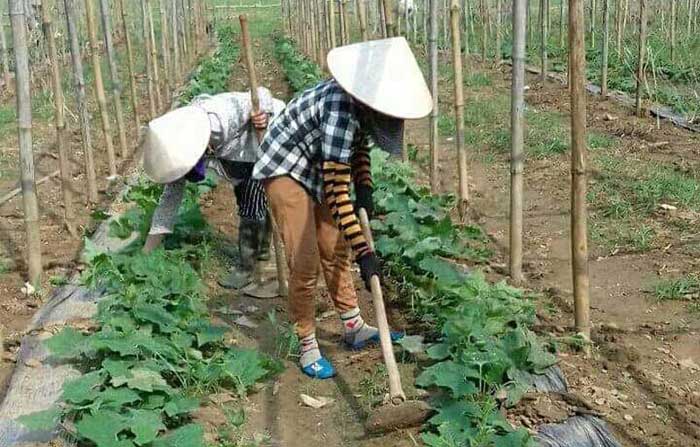
(HBO) – Sao Bay commune (Kim Boi district) of Hoa Binh province has been widely known for local farmers’ dynamism in crop restructuring. Coming to the commune any time of the year, visitors could see the green colour of various vegetables and food crops.
The commune’s proactive switch to plants generating high economic income has improved the livelihood of local people towards sustainable poverty reduction.

Residents in Dam Gian village, Sao Bay commune (Kim Boi
district) grow wax gourd which brings in high economic value.
The commune relies
completely in farming. Earlier, local people lived on the cultivation of rice,
maize, potato and cassava. Farm
productivity heavily depended on weather, resulting in unstable output.
After learning of big consumers’ demand for tuber and fruit vegetables,
the Party committee and People’s Committee of the commune guided local people
to cultivate new plants with high economic values.
Since 2012, local farmers have grown various types of vegetables such as
wax gourd, cucumber or melon, raking in higher income compared to maize and
rice. Currently, pumpkin, wax gourd, melons and cucumber has become key crops of
local residents. Those crops have generated good earnings for many households
in communes of Dam Gian, Sao Bac, Doi Boi and Sao Dong.
We travelled to Sao Bay at the time local people were growing the 2018
winter crop. Accompanied by Bui Huy Ban, the commune’s agricultural official,
we visited a model farm where wax gourd is grown using trellis, with its roots
being covered by polyethylene membranes to keep moisture in soil, while preventing
weeds. The 3-ha model farm in Dam Gian village is owned by three families of
Bui Van Huy, Bui Van Luc and Bui Van Nguyen.
The farm has created permanent jobs for four labourers and temporary
jobs for 20-30 others. In 2018, the average output of gourd at the farm hit
about 70 tonnes per ha, with selling price in the spring crop at 3,000 VND per kg.
According to Bui Van Luc, his family grew pumpkin and wax gourd on 6,000
sq.m., raking in 300 million VND (12,815 USD) a year. Meanwhile, Bui Van Huy’s
family earned 350,000 million VND (14,950 USD) a year from wax gourd.
At present, people in Sao Bay are growing winter crops such as wax
gourd, cucumber, kohlrabi, cabbage, cauliflower and potato. Locals have already
harvested the first crop of wax gourd and are planting the second. Other crops
are growing well, giving hope to local people about a bumpy crop generating high
income./.
In Lac Thuy district, communes have been succeeded in promoting their One Commune-One Product (OCOP) products while others are still struggling to position their typical farming products in market. Some communes in the district still fail to have their products met OCOP programme’s requirements, while others have seen their certifications expired.
The inspectorate agency of Hoa Binh province has issued Official Dispatch No. 1090/TTr-PCTN to provincial departments, agencies, localities, business associations, enterprises, and investors regarding measures to improve informal component indexes of the Provincial Competitiveness Index (PCI).
Hoa Binh is taking concrete steps to improve its investment environment, with a strong focus on supporting businesses, settling obstacles for strategic investors, and creating opportunities for robust development in the coming years.
Under the blazing early summer sun, the construction site of Nhuan Trach Industrial Park (IP) in Luong Son district is abuzz with activities from dawn to dusk, a testament to the determination of the investor to meet their construction targets on schedule.



